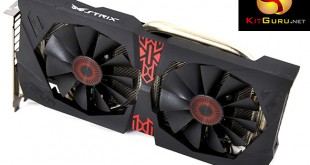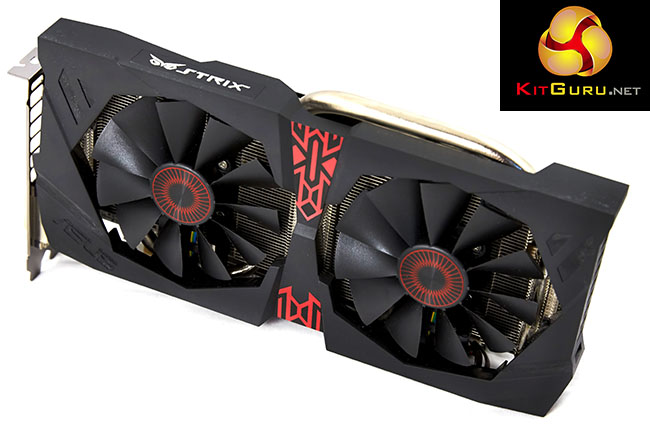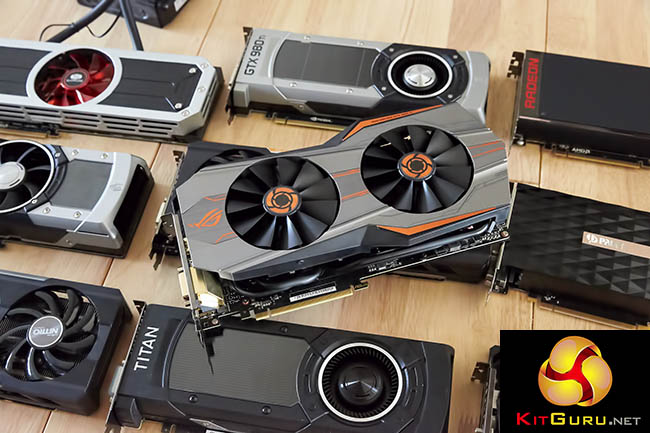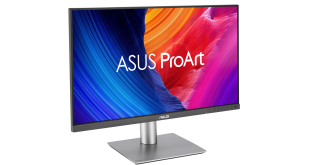
With Christmas just around the corner, what better time to treat yourself to a new graphics card? Time to put that old card to pasture and invest in a new GTX980 ti. If you fancy something really fast and expensive then the mouth watering Asus Republic Of Gamers GTX980 Ti Platinum Edition might sate your appetite. As we would expect from an Asus flagship solution, the Matrix Platinum is a complete ‘no-compromise' design.

The Asus ROG Matrix GTX 980Ti Platinum Edition is a heavy beast – shipping with an all metal, proprietary ‘Direct CU II' cooler and custom backplate. It incorporates a 14 phase DIGI+ VRM with Super Alloy Power II components – to reduce buzzing and eliminate coil whine. If you want to break some overclocking records then you will be pleased to hear that ASUS have a LN2 mode switch on the PCB to unlock voltage and power limits. There is also a ‘Safe Mode' button to reload and recover the vBIOS and a memory defroster to help prevent cold bug issues.
| GPU | GeForce GTX960 |
Geforce GTX970 | GeForce GTX980 |
Geforce GTX 980 Ti | Geforce GTX Titan X |
| Streaming Multiprocessors | 8 | 13 | 16 | 22 | 24 |
| CUDA Cores | 1024 | 1664 | 2048 | 2816 | 3072 |
| Base Clock | 1126 mhz | 1050 mhz | 1126 mhz | 1000 mhz | 1000 mhz |
| GPU Boost Clock | 1178 mhz | 1178 mhz | 1216 mhz | 1075 mhz | 1076 mhz |
| Total Video memory | 2GB | 4GB | 4GB | 6GB | 12GB |
| Texture Units | 64 | 104 | 128 | 176 | 192 |
| Texture fill-rate | 72.1 Gigatexels/Sec | 109.2 Gigatexels/Sec | 144.1 Gigatexels/Sec | 176 Gigatexels/Sec | 192 Gigatexels/Sec |
| Memory Clock | 7010 mhz | 7000 mhz | 7000 mhz | 7000 mhz | 7000 mhz |
| Memory Bandwidth | 112.16 GB/sec | 224 GB/s | 224 GB/sec | 336.5 GB/sec | 336.5 GB/sec |
| Bus Width | 128bit | 256bit | 256bit | 384bit | 384bit |
| ROPs | 32 | 56 | 64 | 96 | 96 |
| Manufacturing Process | 28nm | 28nm | 28nm | 28nm | 28nm |
| TDP | 120 watts | 145 watts | 165 watts | 250 watts | 250 watts |
The Nvidia GTX980 Ti ships with 2816 CUDA cores and 22 SM units. The memory subsystem of the GTX980 Ti consists of six 64-bit memory controllers (384-bit) with 6GB of GDDR5 memory.
The Asus ROG Matrix GTX 980Ti Platinum Edition has received a clock boost over Nvidia’s reference card, with final speeds set at 1,216mhz (core)/1,317mhz (boost). The memory is boosted from reference speeds of 1,753mhz (7Gbps effective) to 1,800 mhz (7,2Gbps effective).

For the last week we have been retesting many graphics cards with the latest AMD and Nvidia drivers and have made the switch to the 64 bit Windows 10 operating system as well. We compare the Asus ROG Matrix GTX 980Ti Platinum Edition against a plethora of high end solutions, including, but not limited to the AMD Fury X, Nvidia Titan X, Nvidia Titan Z, AMD R9 295X2, Nvidia GTX980 Ti, AMD R9 390X and AMD R9 390.
 KitGuru KitGuru.net – Tech News | Hardware News | Hardware Reviews | IOS | Mobile | Gaming | Graphics Cards
KitGuru KitGuru.net – Tech News | Hardware News | Hardware Reviews | IOS | Mobile | Gaming | Graphics Cards



So how does this card compare to the MSI Lightning GTX 980 Ti, and the EVGA Kingpin 980 Ti? Are there significant differences, or is it too close to call?
we haven’t tested the kingpin, we did test the XLR8 model, which is a little lower in the chain http://www.kitguru.net/components/graphic-cards/zardon/pny-gtx980-ti-xlr8-oc/ – my colleague Luke tested the Lightning but I haven’t seen it myself http://www.kitguru.net/components/graphic-cards/luke-hill/msi-gtx-980-ti-lightning-6gb-review/
Nice card but I really wouldn’t want to be spending £650 on a Maxwell card so late in its life cycle, Pascal cards costing half as much will have roughly the same performance in 6-8mths.
So is this 2.5 slot or 3 slot, I keep being told 3 slot design.
then high end Pascal in Q2 2017
Allan, is this 2.5 slot or 3 slot, I keep being told it is 3 slot.
Why do you keep changing your GPU tests, makes it harder to compare due to different situations, stick to one way, if not test all the GTX 980ti again, I would like to have a comparison of GTX 980ti Lightning and the ASUS GTX 980ti Matrix
It’s 2.5 slot.
Source? Even if true, GTX680 outperformed GTX580 by 35% at 1440P on day one of release, and had better feature set and driver support. That means in 2016 we’ll should have a 16nm $500-600 card from AMD/NV that should be 30-40% faster than 980Ti. It won’t be double the performance but it’ll likely have 8GB of memory and better feature set and most importantly the latest driver focus (*Kepler gimping* ahem).
One is the 16nm fab is new…and untested…and you can’t go large and power hungry on first generation chips. Don’t believe how unreliable a new fab is? Look at how long it took Nvidia to pick between Samsung and TSMC and finally siding with TSMC due to their longer working history and reliability.
Second point is…they will kill their own sales by offering their best card right at the release of the new generation. They will not be able to give any reason at all to their enthusiast market to upgrade their card within 3 years of launch. Whereas when you look at Kepler, people bought the 680, then the Titan came out, then the 780, and most people who bought the 680 eventually upgraded to those cards. And then when Maxwell launched, they started with just the 750 and 750ti. Then released the 980 that some bought, and finally after a while, the Titan X and 980ti which gave people (enthusiast market, again) a reason to upgrade.
Nvidia likes incremental upgrades. They don’t want you to buy a card now, and launch another card in a year that completely destroys the card you bought. They put out one card, then 12 months later they bring out another card that is generally just 10-20% faster, so it’s better than what they offered before, but not enough to piss off anyone who bought their last gen cards. And then another 6-12 months later they put out an even better card, with 50%+ better performance than their older cards, and people start upgrading again.
If on day one of the Pascal launch, if they come out with their absolute best card, they are going to have nothing interesting to bring to market for 2 to 3 years until Volta comes out. And that would be silly. Even if it were possible with the new 16nm fab. In terms of business, you need to offer a product that is a bit better than your competition, without being too much better/too costly for you. So they just need to put out a slight performance increase, but sell the card on much lower power consumption, wait for AMD to release something else, and then launch a bigger die version themselves, and back/forth they go. Just a quick reference:
FERMI
———–
GTX 580 = 520mm2
KEPLER
————-
GTX 680 = 294mm2
GTX Titan = 551mm2
MAXWELL
—————
GTX 750ti = 148mm2
GTX 980 = 398mm2
GTX Titan X = 601mm2
Do you see the pattern? Small, Medium, Big, restart. Don’t think about it based on die size. Because it’s really just about transistor count. Pascal at 16nm, even a 294mm2 sized die like the GTX 680, along with HBM2, would result in performance close to the Titan X…and perhaps even higher due to lower heat/power consumption allowing higher clocks.
Hope that helps.
Also NVIDIA has not even released the GTX 990, so why would high end Pascal come out in Q1 2016, no one would buy the GTX 990
Also, you really think it will be 30 percent, node shrinks do not increase performance. It will be the same performance in games. Also we are comparing a GTX 980t, not the GTX 980, the GTX 1080 will have the same performance as the GTX 980ti
https://www.youtube.com/watch?v=Lqq6gJlKvtk
There you go, all you need to know 🙂